Dilated Cardiomyopathy


Comments:
Dilated cardiomyopathy (DCM) refers to weakening and subsequent dilation and dysfunction of the myocardium. There is usually some concomitant hypertrophy as well. The image shows biventricular dilation of the heart and a thrombus at the apex of the left ventricle. In DCM the heart is usually enlarged and flabby. There are no specific histologic abnormalities in DCM. The causes of DCM are many and include genetic (30% to 50% of cases), toxic (e.g. alcohol, chemotherapeutic agent doxorubicin), metabolic (e.g. iron overload in hereditary hemochromatosis), and infectious agents as well as previous myocardial infarction. Mutations in TTN encoding Titin protein account for almost 20% of cases of DCM. Chagas disease caused by Trypanosome cruzi is a common cause of dilated cardiomyopathy in Latin America. Image Copyright: pathorama.ch.



